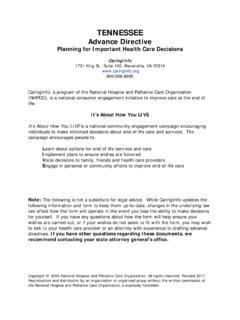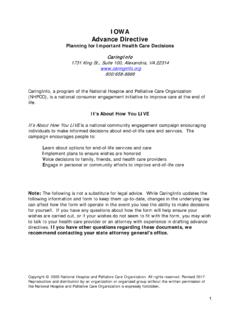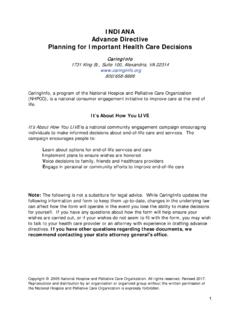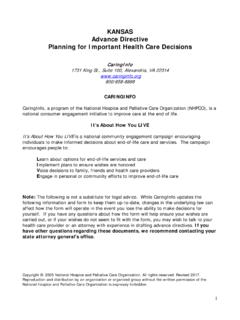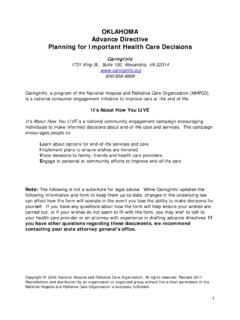Transcription of CaringInfo
1 CaringInfoIf talking is so important, why is it so hard?Family life is mostly talk. Good talk, bad talk, talks to fill in the blank spaces, talk to express love and hurt and every other emotion. We play back certain conversations endlessly in our memories some we treasure, some are a source of pain. From our first word to our last, the context of conversation is often our topics are much easier to talk about than others. Even families who dive right into arguments over money, sex and politics can find themselves mute when someone brings up a topic we all need to consider. How do we feel about choices and care around the end of life? What do we want? What are we worried about? Who will decide for us if we cannot?
2 This booklet is a starting point for these necessary conversations. You will read about many opportunities and ways to raise the issue. Once you realize how many conversations triggers there are in daily life, you will be ready to start your own conversation. And starting is the most important part. Too often, these conversations don t take place until there is no time left for honest discussion, reflection and these conversations, before the crisis is not only much easier, it is much more valuable. If you can begin to talk about the end of life while people are still healthy, you will have made a significant contribution to your family, and you will discover important information for yourself.
3 Understanding family includes understanding hopes and fears around illness and dying. Conversations before the crisis help a family cope with inevitable loss; preparing for death helps those who live on most of is the single most important thing that family and friends can do to prepare for the end of life of someone they love. Always difficult, the end of life can be amazingly rich. Learning, insight and love are possible to the last breath, and beyond. Talking about this time make a rich ending more think what?Howard McGrath and his cousin Rebecca Martin sit next to each other at the family supper following the funeral of their grandfather. Howard and Rebecca spent a lot of time together as children, but they see each other only once or twice a year now.
4 As they talk, they both remark that their own parents are becoming then discuss the chemotherapy that their grandfather endured before his death from cancer. Howard feels that it destroyed the dying man s quality of life. I don t think it would be worth it, he says. I would rather be able to do what I want, to be with my kids, to enjoy life for a shorter time. I don t think all that treatment was a good thing. 1 I absolutely disagree with you, replies his cousin. Even one more day would be important to me; I d do everything I could to hold onto life. I admire the way he fought, and I plan to do the very same thing. The death of a relative is an obvious and excellent starting point for a conversation.
5 Howard and Rebecca have discovered that they hold opposite views about a fundamental issue. A discussion about difference, and respect for choice, has cannot assume that we know what someone else needs or wants. The object of talking is not to impose a right choice on others. It is to learn what each member of the family thinks about the choices, and up ways to talkIn today s world, there are many current events that serve the same function for us as the funeral of a family member. They help start conversations. But first, you need to examine your own views. It is honest, and fair, to explore your desires and fears about nearing the end of life, and communicate them to your family. Too often, adult children sit down with aging parents and want to make the parents face the hard issues.
6 It will be much more effective if you do your own emotional homework first. There are many events and openings that can help you get started. If you want to be the conversation initiator, think about some of the issues (many are listed throughout this booklet) and then watch for a good opportunity. You will be surprised at how many possibilities you find. Conversation triggers include: The death of a friend or colleague Newspaper articles about illness and funerals Movies Sermons Television talk shows, dramas and comedies Financial planning Annual medical checkups Family occasions such as baptisms, marriages and (especially) funerals Magazines and books23.. advance directive, a general term that refers to your oral and written instructions about your future medical that communicate effectively Susan and RichardWhen Susan and Richard experienced the death of a friend with a small child, they immediately made their wills.
7 Their attorney gave them a booklet about advance directives, a general term that refers to your oral and written instructions about your future medical care, in the event you become unable to speak for yourself. They talked about the end of life and decided on the basics of what they and Richard are part of a family that communicates easily, and can have forthright conversations. When they gave a copy of their advance directives to their parents and asked them to keep a copy, the parents agreed. So, says Susan s father, it looks like you tow have made some important choices, and we appreciate knowing what they are. Your mother and I have been planning to make some decisions ourselves, and now that we ve seen you do it, we are going to do the same thing.
8 We ll feel better knowing that this planning is done, and that you and our doctor know our wishes. It s a hard thing to think about, but it s a relief to face it. Few families have this much confidence, clarity and communication skill. The following conversation between Steven, a man in his 40s and his father is more difficult conversation between father and sonSteven brings up the subject of , he says. I ve been thinking about the end of life lately, the end of my life. I know it sounds weird. Nothing is wrong. But a friend of mine at work had a terminal illness and his family didn t know what he wanted. The family disagreed about what to do, if he should be put on a ventilator and other stuff, and it made the whole thing so much harder.
9 I don t want that to happen if I should suddenly be in that situation. Let s not talk about this now, his father says. You re healthy and young, and nothing bad is going to happen to you. Besides, if we talk about it, it could come true. Talking about difficult things does not make them happen. Since Deborah is my wife she d have the legal responsibility to decide, but I would want you and Mom to understand and help her. And to be able to explain to the kids that this is the way I wanted it. So tell Deborah, but don t tell me. I don t want to know. The conversation has begun. Steven and Deborah begin their own conversation and complete their advance medical directives. A few months after the first conversation, Steven gives his father a copy of his plans.
10 4 Dad, I know that you don t want to talk about this, but Deborah and I have agreed on what we each want, and have written it down. My doctor has a copy. I want you to know that I plan to be conscious and able to communicate as long as possible, while Deborah is worried about pain and would prefer to be sedated, even if it means being out of touch. Which do you think you would want? I don t want to choose. I want to die in my sleep. Well, that may happen, but you can t be sure of that. This may be as far as Steven can go right now. But it is a good bet that at some point, one of his parents will raise it with the other. Over time, Steven can use current events and family happenings to restate his concern.



